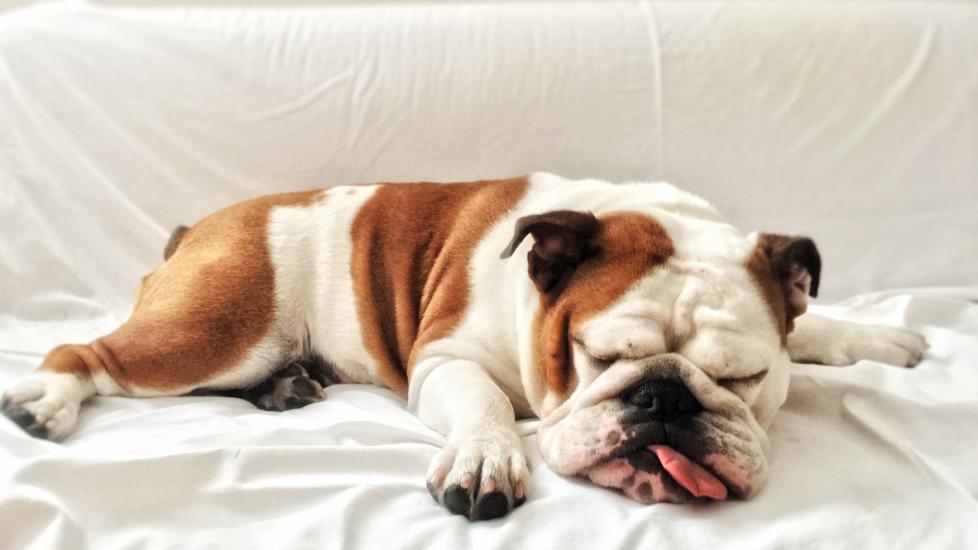What Causes Snoring in Dogs and How to Help Your Pup
Humans aren’t the only ones that snore—dogs can, too. Some causes of snoring in dogs are minor, but sometimes snoring is caused by serious health issues. Here’s what to know about your snoring dog.
Why Do Dogs Snore?
Snoring occurs when something is obstructing or restricting the airflow in a dog’s nose or throat. The medical term for snoring is “stertor,” and there are several possible causes.
Anatomy
A common cause of snoring in dogs is due to the structure of their airway. Brachycephalic breeds (dogs with short faces) are the most susceptible to anatomical causes of snoring. These dogs—such as French Bulldogs, English Bulldogs, Pugs, Pekingese, and Boston Terriers—can have several structural deformities that enhance breathing difficulties and snoring, including:
-
A long soft palate: The soft palate is the back of the roof of the mouth, and the long palate found in brachycephalic dogs partially blocks the opening of the windpipe.
-
Narrow nostrils: This makes it more difficult to breathe.
-
A narrow trachea (windpipe): As the dog breathes in, the narrow airway collapses down. This is essentially what happens to a straw when you try to drink a milkshake.
-
Abnormal laryngeal tissue formation in the throat: This tissue sits on either side of the windpipe and blocks airflow.
Allergies
Allergies can cause the tissues in the airway to become swollen and inflamed. That extra swelling restricts the dog’s airflow and leads to snoring.
Obesity
Obesity in dogs can also cause snoring (along with several other health issues). The extra fat deposits in the neck around the airway structures put pressure on the windpipe, narrowing the opening.
Sleeping Position
Occasionally, your dog’s sleeping position can cause temporary snoring. For example, if your dog lies on his back in a way that allows the tongue to relax toward the back of the throat, it could cause snoring. Or if your dog is resting his neck on something like a stuffed toy, it could put pressure on the neck and cause snoring.
Infections and Illnesses
Similar to allergies, an infection or illness can cause the tissues in the airway to become swollen and inflamed. Some common ailments that can cause snoring are:
-
Upper respiratory tract infections
-
Abscesses
-
Fungal infections
Masses or Growths
Another cause of dog snoring is a tumor or growth inside the airway that obstructs the airflow. Some growths, such as nasal polyps, are benign but can still be problematic because of how they disrupt normal breathing.
Other growths can be something malignant, such as a nasal carcinoma or nasal fibrosarcoma. These block the airway the same as polyps do, but they can also spread to other areas of the body.
Fluid Accumulation
Exudates (masses of cells or fluid) or clotted blood can accumulate in the nasal cavity due to an illness or injury. The fluid accumulation narrows the airway and affects the normal flow of air—leading to snoring.
Foreign Bodies
Dogs investigate the world by sniffing and smelling. But, sometimes, they accidentally snort a foreign object into their airway. These objects can cause snoring as well as other clinical signs like sneezing and nasal discharge.
When Should I Be Concerned About My Dog Snoring?
It’s not always easy for a pet parent to know if their dog’s snoring is something to worry about, but one cause for concern is if the snoring is new. This suggests a change worth investigating. Pet parents should also take note if the snoring is accompanied by other clinical signs, such as nasal discharge, sneezing, or changes in energy level.
While snoring is normal for brachycephalic breeds, if it happens all the time—including when your pet is awake—this could be affecting your dog’s ability to breathe comfortably. It also puts your pet at risk for a respiratory crisis, especially in warm weather or in times of stress. Sometimes, surgery to remove the extra tissues obstructing the airway can greatly improve your dog’s quality of life.
If you’re worried about your dog snoring, talk to your veterinarian. They can help determine the possible causes. Giving your vet a detailed history of how the snoring started, your dog’s activities when the snoring occurs, when the snoring is better or worse, and any other abnormal signs will help them identify the cause. Diagnostic tests such as X-rays, CT scans, and endoscopy help to definitively diagnose the cause of snoring.
How To Stop a Dog from Snoring
To help quiet a snoring dog, you need to:
-
Remove whatever is blocking your dog’s normal airflow
-
Open up your dog’s airways
-
Adjust your dog’s sleeping position
A long soft palate, abnormal laryngeal tissue, foreign bodies, or tumors in the airways can usually be surgically removed, thereby improving the flow of air through the airways.
If the snoring is caused by allergies or infections, treating the underlying cause of the inflammation will likely improve the snoring. Reducing any excessive weight can help alleviate the extra pressure around the neck, stopping the snoring as well.
Featured Image: iStock/marcoventuriniautieri
